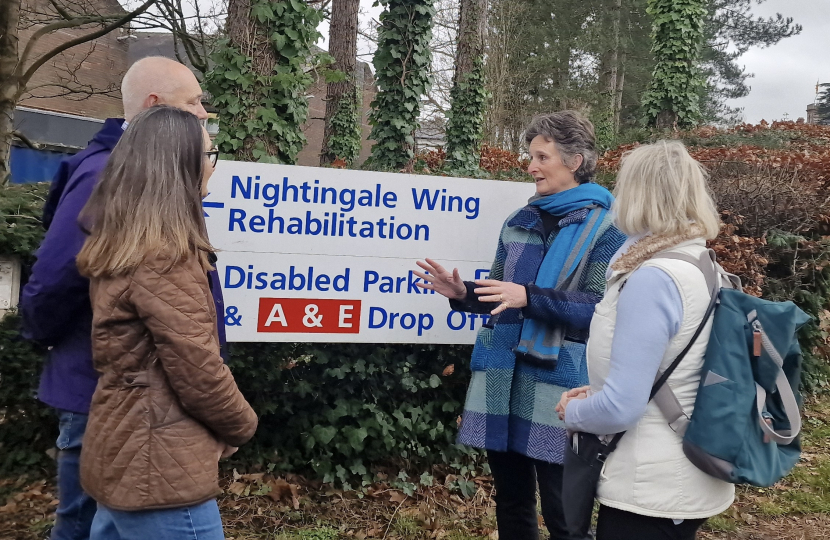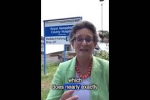
This is a Fact sheet provided by Hampshire Hospitals Trust. It shows that far from A&E disappearing, most of the treatment will still be done in Winchester but we will also have a modern new hospital 10 minutes up the road for the most serious conditions. The Consultation closes on 17th March and we need this new hospital near Junction 7 and not the existing Basingstoke site so please fill in the consultation.
Modernising our hospitals and health services
1 Introduction
This factsheet provides more detailed information on our proposed new urgent treatment centres, and the benefits of consolidating emergency care.
Under the proposals that the NHS in Hampshire is currently consulting on, we would develop two brand new 24/7 doctor-led urgent treatment centres – one at the new specialist acute hospital (on either the current Basingstoke hospital site or near Junction 7 of the M3), and one at Royal Hampshire County Hospital, Winchester.
This factsheet should be read in conjunction with our full consultation document which is available on our website at https://www.hampshiretogether.nhs.uk/consultation-document.
If you have any questions after reading this factsheet and our consultation document, you can get in touch with us by:
· Email at: [email protected]
· Post: Freepost HAMPSHIRE TOGETHER
· Phone: 0300 561 0905
· Or come to a face to face or virtual public meeting
2 What care would the urgent treatment centres provide?
The urgent treatment centres would be able to diagnose and treat all but the most serious illnesses and injuries, for people of all ages, including babies. Many of these conditions are currently seen in our emergency departments (also referred to as A&E).
Teams of healthcare professionals, led by doctors, would treat serious but not life-threatening emergencies, illnesses, and injuries, for example suspected broken bones, cuts, stomach pains, rashes, high temperatures in children and adults, and urgent mental health concerns.
3 Quicker treatment, safer care
Our urgent treatment centres would be run by senior doctors working with advanced nurse practitioners and other health professionals to provide quick diagnosis and treatment 24 hours a day, 7 days a week, 365 days a year.
They will offer a ‘walk in’ service, as well as see and treat people referred by NHS 111, their GP, or who are brought in by ambulance if appropriate for their needs.
They will also give patients access to a wide range of tests and scans, including blood tests, urine tests, x-rays, electrocardiograms (ECGs), CT, and MRI scans. They are able to provide the same medications as an emergency department, provide emergency contraception, and have direct access to local mental health services.
They would see and treat around 60 per cent of people who currently attend our hospitals’ emergency departments.
Visits to the urgent treatment centres will be quicker and more efficient because we won’t have to prioritise critically unwell patients, as they will be seen and cared for in the emergency department by a different team.
Moreover, because both the urgent treatment centres would be located on the same site as larger hospitals, they will provide a wider range of services than many other urgent treatment centres and have access to specialist doctors and specialist services. For example, patients will be able to be referred seamlessly to other services if needed, such as same day emergency care departments (SDECs) on the same site.
Both Winchester and the new hospital would have SDECs, where patients can be quickly assessed, diagnosed, and treated without necessarily being admitted to a hospital ward and, if clinically safe to do so, will go home the same day. This saves them being admitted to hospital for a longer period where appropriate.
Our urgent treatment centres will allow our emergency medicine specialists to focus on the patients who are most unwell in the emergency department, while those who are not as seriously ill will receive faster treatment from a more appropriate professional in the urgent treatment centres.
4 The benefits of bringing emergency services together
With the introduction of two new urgent treatment centres – one at Winchester and one at the new hospital – only the sickest patients, with the most serious conditions, such as loss of consciousness, seizures, and cardiac arrests, would go to the new hospital’s emergency department, most often taken by ambulance.
In fact, some emergency services, such as treatment for strokes, heart attacks and major accidents, are already only provided from one of our hospital sites at the moment.
And there is a wealth of clinical evidence to support bringing all emergency care together on one site. We know that, for example, even if people have to travel further, they get faster access to the right senior clinicians, are seen in better facilities, and have better outcomes.
Even today, the way our services are configured means that some patients who arrive at the emergency department at Winchester, who do not arrive by ambulance but who do require emergency care, need to be transferred to Basingstoke or other hospitals in Hampshire for specialist care.
Bringing together more specialist services for the most seriously ill patients onto one site, as we are proposing, would mean we are able to bring services in line with best practice and national guidelines.
It means if you are critically unwell and need an emergency department, you would be seen by experienced senior doctors and nurses who are specialists in their field. This would have significant benefits for patients, both in terms of improvements to their care and their clinical outcomes.
5 Exploring the options for an emergency department at Winchester
We have exhaustively explored potential options to keep an emergency department at Winchester hospital. However, local doctors strongly and collectively believe that an emergency department at both hospitals would not be clinically safe or sustainable because:
· we would have to continue to spread our consultant emergency doctors across two sites, meaning that we would have consultants on site for fewer hours each week
· we would continue to not have enough junior doctors to provide the ideal cover at all times on both sites
· under our new model of care Winchester hospital would not have the support services that are needed for an emergency department, for example critical care and emergency surgery, so patients needing these services would have to be transferred to the new specialist acute hospital even if Winchester did have an emergency department
· we would not have enough staff to sustainably provide, on both sites, these essential services that need to be located together
· the South East Clinical Senate, an independent panel of senior clinicians that quality assure proposed changes to services, expressed “significant concerns” about keeping an emergency department at Winchester under our proposed options, and said they were “not confident” it would be safe to do so
6 Get involved and have your say
Patients, local people, and NHS staff are being encouraged to get involved in the public consultation and give their views on all the proposals, which include:
· building a brand new hospital on the current Basingstoke hospital site or near Junction 7 of the M3 for specialist and emergency care, such as strokes, heart attacks, life and limb threatening injuries, emergency surgery, obstetrician-led maternity care, and a separate children’s emergency department
· significantly investing in Winchester hospital which would focus on planned operations and procedures, and provide a 24/7 doctor-led urgent treatment centre that would see and treat around 60% of the patients who currently go to Winchester A&E, same day emergency care services, and a midwife-led birthing unit
· continuing to provide day-to-day hospital services such as outpatients, diagnostics, and therapy services from both the current main hospital sites, and additionally at the site near to Junction 7 of the M3 if this is chosen as the location for the new hospital.
To find out more, attend an event, or complete the questionnaire, visit www.hampshiretogether.nhs.uk. The consultation is open until midnight on 17 March 2024.
7 More information on urgent treatment centres
There is more information on urgent treatment centres nationally, including principles and standards, and frequently asked questions, on the NHS England website.
